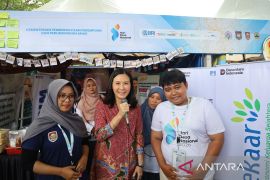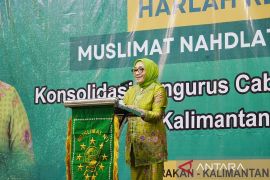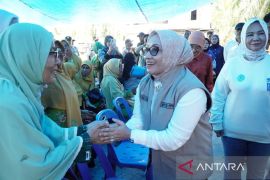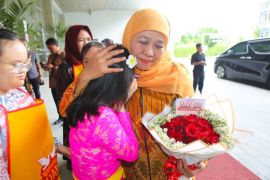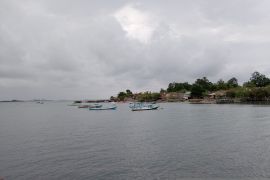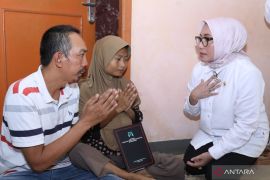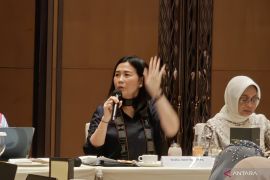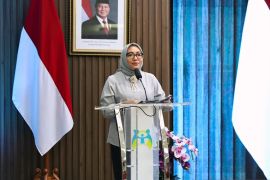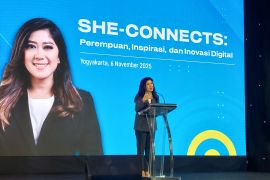"Experiences throughout the world have shown that the easiest and cheapest way to boost the economy is through women empowerment," Jokowi noted.Jakarta (ANTARA News) - The issue of womens empowerment has been taken up as one of the priorities in regional cooperation among the 21 member countries of the Indian Ocean Rim Association (IORA).
Certainly, this has happened, thanks to three female foreign affairs ministers who actively promoted the importance of womens empowerment in order to improve public welfare, while chairing the IORA Council of Ministers Meeting held in Jakarta on March 6, 2017.
The three female ministers were Indonesian Minister of Foreign Affairs Retno Marsudi as the chair of the ministers meeting and her two counterparts, namely Maite Nkoana-Mashabane as the vice chair of the meeting from South Africa, and Julie Bishop as the former chair from Australia.
"This is an exceptional occasion where there are three female figures leading the IORA ministerial level meeting " Retno stated.
Retno considered the occasion to match with one of the priority areas discussed in the summit, namely women empowerment.
Her Australian counterpart Bishop viewed that economic empowerment of women is a necessary step for the economy to flourish in the region.
The IORA groups Australia, Bangladesh, Comoros, India, Indonesia, Iran, Kenya, Madagascar, Malaysia, Mauritius, Mozambique, Oman, the United Arab Emirates, Seychelles, Singapore, Somalia, South Africa, Sri Lanka, Tanzania, Thailand, and Yemen.
In addition, IORA has seven dialogue partners, namely the US, the UK, Japan, Germany, Egypt, France, and the Peoples Republic of China.
In the First IORA Summit held in Jakarta on March 7, IORA leaders issued a Jakarta Concord that, among other things, encourages member countries to strengthen women empowerment.
The Jakarta Concord titled "Promoting Regional Cooperation for a Peaceful, Stable, and Prosperous Indian Ocean" aims to lay the foundation and set the course for cooperation of Indian Ocean states in the coming years.
The concord was signed by Indonesian President Joko Widodo (Jokowi) along with several foreign leaders, including President of South Africa Jacob Zuma, President of Mozambique Filipe Nyusi, President of Sri Lanka Maithripala Sirisena, Prime Minister of Australia Malcolm Turnbull, Prime Minister of Malaysia Najib Tun Abdul Razak, and President of Yemen Abd Rabbuh Mansur Hadi.
The IORA has initiated several activities to promote regional cooperation over the last several years under Indonesias chairmanship (2015-2017).
In 2016, for instance, IORA had issued a Declaration on Gender Equality and Womens Economic Empowerment during its 16th Council of Ministers Meeting held in Bali.
"Experiences throughout the world have shown that the easiest and cheapest way to boost the economy is through women empowerment," Jokowi noted.
"Behind every great man, there is a great woman," Jokowi further added in his opening remarks of the IORA Summit.
After taking over the chairmanship from Indonesia, Zuma, the current IORA chairman until 2018, pointed out the associations country members need to empower women and marginalized communities by developing inclusive economy.
Zuma also expressed hope that the association would be beneficial for future generations of the the member countries, whose population totaled 2.7 billion, or 35 percent of the worlds population.
The use of digital innovation to empower women was highlighted in the second session of the IORA Business Summit held in Jakarta on March 6.
Digital innovation in the postmodern era has produced a device which was considered to be very helpful to empower women globally, including in the region of IORA.
A speaker from Malaysia the, Chief Executive Officer (CEO) of CIMB Group Tengku Dato, Sri Zafrul Aziz, noted that the innovation is urgent because only about 46 percent of women in Southeast Asia region have bank accounts and only a few other have access to bank loans.
According to the Australian CEO of Austrade, Stephanie Fahey, women can transfer funds in the network by using a mobile phone without having a bank account, thanks to the digital innovation, which is considered as the fourth industrial revolution.
"The development of future trans-digital innovation could also create opportunities for women to improve their welfare," she noted.
She also underlined that educational aspect is a very important issue, especially to encourage women to study in the fields of science, technology, engineering, and math.
A similar view was voiced by President of the Black Business Council of South Africa, Danisa Baloyi, who agreed that digital innovation, like the development of mobile technology, could change the fate of many citizens.
"If you look at Africa, telephone sophistication has changed the lives of many people, which allows people to communicate and transact in many rural areas," she pointed out.
She also urged various parties to do more to empower women, especially to empower multitasking skills that many women have.(*)
Reporter: Fardah
Editor: Heru Purwanto
Copyright © ANTARA 2017

